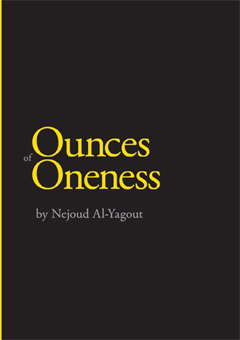 Nejoud Al-Yagout. Photographed by Djinane Alsuwayeh
Nejoud Al-Yagout. Photographed by Djinane AlsuwayehKuwait Times: Tell me about Ounces of Oneness. What is the inspiration for this work? What does the title refer to? What are the main themes/ideas?
Nejoud Al-Yagout: Spiritual awakening is a terrifying journey. We associate it with light; and sugarcoat the darkness. This journey of light, of darkness in itself was my inspiration. The title indicates stepping into the forum of non-duality, in ounces; as the narrator has only grasped oneness conceptually as yet. The main themes are the dark night of the soul, universality in an era of heightened awareness and the energy of universality that kisses our being constantly, asking us to awaken from the illusion of separation and divisiveness.
KT: This is your third book of poetry. How do you see Ounces of Oneness differing from This Is An Imprint and Awake in the Game of Pretending?
Nejoud: I don't believe in favorites, as I change with the flow or flow with the changes, for that matter; but I must add it's different because it was incredibly easy to write, though it wore me out completely. In fact, merely the idea of publishing another book right now makes me weary!
KT: Can you tell me a bit about the evolution of your writing? How has it changed/developed/evolved over the course of the three books? Do you see significant changes in your approach/subject matter/point of view?
Nejoud: I cannot say whether it has evolved, but I am now reaching parts of me that were previously untouched. And I keep tapping more and more into the collective - somehow - as I navigate both my darkness and unknown spiritual terrain. There is more compassion for what we perceive as evil after becoming acquainted with my own demons. This is particularly evident in Ode to a Terrorist. I could have never written a poem like that in the past, because I was trapped in polarized thinking. I still am, but I am aware of being trapped, and the voice inside of me is nudging me toward liberation from polarities via the channel of poetry.
KT: Much of your work is about self-awareness, about the journey of self-discovery and spiritual awakening. How does that resonate with the readership in Kuwait? Do you find that readers understand or get what you are trying to say? Do you think these ideas reflect a frustration within the society as a whole?
Nejoud: It resonates because it is something within us all, albeit beneath layers of dogma and conditioning. Sometimes, when I am addressing the divine, readers think I am referring to a lover; but I never interfere with a person's interpretation unless asked to do so. Especially since I do touch on human love often. As for spiritual awakening, people are frustrated with our incessant need to belittle the "other." Awareness is certainly a remedy in that it liberates us from allegiance to harmful institutions that were considered glorious in days of yore.
KT: Some of your work hints at social or political commentary. Such as:
Scattered bullets, scraped knees on
side-streets of devotion, a heart
bleeding in overdrive, tears for
an ounce of oneness
Nobody can quite explain it,
but we choose to go to hell for one
another to find our paradise
on the way to:
this
Some readers may interpret this as referring to a particular conflict. Do you mean to imply or hint at this or is this a way of using the metaphor of war to describe personal conflict? Do you think that you incorporate violence as a metaphor as a result of the regional turbulence and instability? How does this impact your work overall?
Nejoud: The bullets are representative of war, yes. We must transcend violence and madness in order to reach a point where we no longer feel separate from one another. The tears are all prerequisites for love, for feeling we are one.
This poem addresses the notion that we would willingly enter hell to experience paradise with someone. This is not an enviable position at all; for hell is what arises when we glamorize or grow accustomed to torment. Love is way too grand and has no place in either hell or heaven. The concept of agony and bliss in a relationship is something we will eventually unlearn in order to experience what is beyond both. Otherwise, we will bounce from one extreme to another, as if oft the case with many ships sailing the seas of connection: relationships, friendships, partnerships.
KT: What to you are the most important concerns that poets in Kuwait and region today are discussing?
Nejoud: Censorship. Many writers still write in metaphors or avoid writing altogether. I have a friend whose poetry would blow you away, and she wants to share her verse with the world; but she cannot publish her work because her family would disown her as she speaks of love and intimacy. How could she know love as a married woman stuck in a marriage of convenience?
In terms of my writing, sometimes I have to provoke others in order to honor what presents itself to me in my inner world. Evidently, if I am defending those who are ostracized, some people may get offended, but the oh yes inside of me is more potent than the oh no! And, in turn, love is more potent than political correctness. Love certainly propels me and is quite insistent.
On a personal level, I am not interested in poking fun at others' beliefs. Even when I employ satirical verse, or criticize our arrogant ways, it is because I am frustrated that we have not yet learned how to love, myself included.Writing is there to assist my own self-evolution and shed my own darkness, first and foremost.
KT: How do you see the literary scene in Kuwait (Arabic or English)? Do you think its thriving or otherwise?
Nejoud: It is thriving. I have been introduced to so many talented writers here, published and unpublished. In terms of language, we should always write in the language of the voice in our heads, regardless of nationality.
KT: When and where will Ounces of Oneness be available for readers in Kuwait? Will you be doing public readings/book signings or other events that readers should look out for?
Nejoud: It's available on Amazon, Barnes and Noble, FriesenPress, iBooks and other online retailers. My book launch will probably be at the end of September. I never know where my book will end up locally, but Dar Nur and Q8 Bookstore (in the Yarmouk Cultural Center) have been my greatest supporters and always stock my babies. CAP Gallery has also stocked my books before. As for readings, I usually announce them on social media. The very idea makes me tremble! I always say that publicly reciting is as appealing to me as dancing with lions or waltzing with crocodiles. I don't think I can ever get used to it. But the life-force within me finds ways to get me out there somehow. And, for now, bless diversions and disguises!
www.nejoudalyagout.
@nejoud.alyagout
BOOK REVIEW
Ounces of Oneness by Nejoud Al Yagout
A review by Jamie Etheridge
 .
.Letting go of our stereotypes, transcending the labels that bind and define us is never easy. But in her third collection of poetry, Kuwaiti poet Nejoud Al-Yagout takes the read on a spiritual journey, asking him/her to peel away the layers of preconceived notions, to 'shift the paradigms' of our thinking, to let the masks of our outer selves fall away and to seek a deeper understanding with ourselves and the universe.
I've been a fan of Ms Al-Yagout's writing since her seminal work, This Is An Imprint, hit the shelves in Kuwait in 2015. Soft spoken in person and in her poetry, Ms Al-Yagout is a well known literary figure in Kuwait and easily bridges the local vs expat divide, writing in English and often reading / performing at local literary events. Her poetry is smooth and subtle in its approach and yet brave and daring in how it challenges the reader to let drop the veils of self delusion and "rise above superficiality," an all too familiar problem in the world these days.
Al-Yagout sets out to awaken the reader's spirituality, evoking the harmony of love and the universality of inner awareness. She dares the reader through subtle verse and clever wordplay to connect with his inner guru and to seek out self inquiry as a means to enlightenment. Her poems gently poke and prod at our egos and shallow exteriors, taking us for an evening stroll along the waterfront edge of self awareness, where she then invites us to trade haughty conventions for the purity of love and the possibly of renewal.
At times playful and irreverent, Ounces of Oneness circles the loci of the soul, gently inviting the reader to closer inspection of the inner. Al-Yagout rejects the muddy, war-torn realities of the external for the swaying, dancing lightness of introspection. She also teaches us through quiet persuasion to relinquish the labels and social divides we hold dear as in 'Universality':
Allow me the honor to love those you hate,
to include those you exclude
Allow me the honor to make peace with those
upon whom you declare war and allow me to
befriend your enemies
Let me kiss those from other sects, faiths
and make love to the wayward, the wizards,
the astray, the clowns and so-called fools
I didn't come all the way to earth
to love only you
I didn't come all the way to earth
to love only me
In what is definitely my favorite, Al-Yagout pays tribute to the symbolism of her arid homeland in the moving, Dunes:
I wash my face in a mirage,
becoming water
I do not care or perhaps I care
too much
about sandstorms,
cacti, falcons
and all that jazz,
but I know so well:
We are dunes.
And I can finally breathe.
Not all her poems, however, seek the sanctity of inner spirituality. As a poet living in one of the most troubled regions in the world, Yagout does not shy away from commenting on the headlines. In 'Ode to a Terrorist', written after a Saudi suicide bomber killed 27 worshippers and wounded dozens more in June 2015 at the Imam al Sadiq mosque in Kuwait City, she takes on the question of ideology, hate and the damage it does.
In simple yet elegant language, Ounces of Oneness invites the reader to see past the chaos and, looking inward, recognize the essence of the divine in us all.










